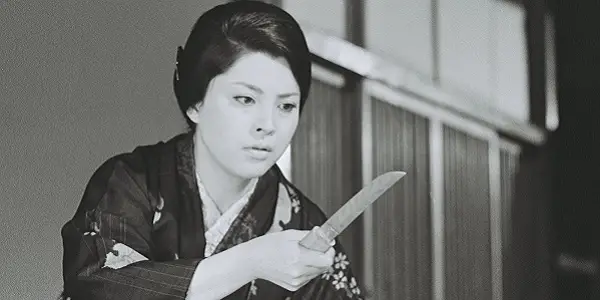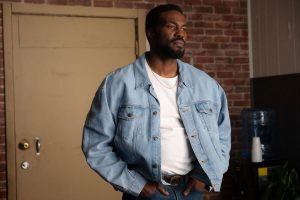
An avant-garde epic that juxtaposes the lives of anarchist Sakae Ōsugi and his anarcho-feminist lover Noe Itō with those of two students attempting to uphold their ideals, Eros + Massacre epitomizes the experimental art and radical politics of its director, Kijū Yoshida. Originally released in France in a 216-minute cut that was edited down to 167 minutes for the film’s Japanese release in 1970, it’s not a film that one watches passively, but an intellectual exercise that stretches your capacity to comprehend. Film at Lincoln Center is presenting the Japanese theatrical cut of Eros + Massacre in a gorgeously aged print full of crackles and visual texture as part of their sprawling retrospective of Yoshida’s oeuvre, The Radical Cinema of Kijū Yoshida; it is a film that demands to be seen in a theater where one can devote one’s full attention to it, without interruption, and contemplate it further on the trip home afterward.
Love and Anarchy
Sakae Ōsugi, Noe Itō, and Ōsugi’s young nephew were assassinated in the chaotic aftermath of the Great Kantō earthquake in 1923 in what is now known as the Amakasu Incident. Yoshida’s film depicts the first meeting between these two famed activists; Ōsugi (Toshiyuki Hosokawa) is already a well-known radical, while Itō (Mariko Okada, Yoshida’s wife and collaborator) is a young writer and editor at the feminist literary magazine Seitō (Bluestocking). The still girlish and optimistic Itō wants to really help people through her work and ensure action is taken beyond just words being written; she consults Ōsugi as a more experienced member of the movement who may understand where she is coming from and be able to guide her on the right path.
source: Gendai Eiga Sha
What follows is an enduring partnership both political and personal as the two of them collaborate on writing projects while also carrying on a passionate love affair. Ōsugi and Itō are both firm believers in free love; Itō has a husband, while Ōsugi has not only a wife but another long-term lover, a feminist reporter named Itsuko Masaoka (Yuko Kusunoki, playing a loosely fictionalized version of Ichiko Kamichika, whose protests over the film are what led to those aforementioned cuts. She also sued to stop the release altogether but to no avail).
Eventually, Masaoka’s intense jealousy of Ito leads her to stab Ōsugi, and it’s this pivotal moment of violence—not the assassination—that is the climactic moment of Eros + Massacre. Yoshida and his trio of characters approach this particular attempt on Ōsugi’s life from various angles with different outcomes, including Itō blaming herself for Ōsugi’s apparent demise. This accordion-like sequence of jealousy and grief folds in on itself and expands outward again, over and over, in a way that grows increasingly dizzying, especially since the film has already shown Ōsugi, Itō, and his nephew dead post-assassination. And yet, this is just one of how timelines are played fast and loose in Eros + Massacre.
source: Gendai Eiga Sha
Born in Flames
Throughout the film, Yoshida cuts between scenes featuring the evolution of Ōsugi’s messy ménage à quatre with those highlighting the misadventures of two students in contemporary Japan: Eiko (Toshiko Ii), a young woman involved in an underground prostitution ring who shares Ōsugi and Itō’s belief in free love, and Wada (Daijirō Harada), a young man perpetually in a frenzy and almost always playing with fire. While the scenes that take place in the 1920s have a slower, more dreamlike pace, with longer shots and fewer cuts, the scenes in the 1960s are fast-paced, scored to feverish jazz, and full of rapid-fire edits that echo the frenetic nature of Eiko and Wada’s wanderings. At one point, the already blurry line between past and present dissolves altogether, and Eiko is able to ask Ito face-to-face about her life choices; mainly, if she had never come to Tokyo with Osugi, might she still be alive? Towards the end, Eiko and Wada encounter the 1920s ensemble in a film studio and take their photograph, as though capturing the cast of a play taking their final bows before the curtain falls.
Yoshida switches back and forth between the two timelines freely, with seemingly little thought for the best places for natural transitions. It’s a style that takes some getting used to, especially when it comes to keeping track of which characters exist in which timeline, but given Eros + Massacre’s hefty length, there’s more than enough time to figure it all out. Still, I found myself vastly more invested in the 1920s storyline than the 1960s one, in large part due to Okada’s richly rewarding performance as Noe Itō. Okada has a natural inner spirit that shines through her beatific face in every role she takes on; her beauty is timeless but her personality is distinctly modern, making her the ideal choice to embody a figure like Itō, whose writings on prostitution, abortion, and other then-scandalous topics signified her as someone far ahead of her time.
source: Gendai Eiga Sha
While watching Eros + Massacre I couldn’t help but be reminded of my favorite Okada role, in Yasujirō Ozu’s marvelous Late Autumn. In that film, she plays Yuriko, the vibrant and opinionated friend of the main young female character, whose modern viewpoints on love and (re)marriage—and her often quite funny ways of delivering them—make her the perfect representative of the clash between generations that Ozu so loved to explore in his work (and does so to great effect here). As seen in Eros + Massacre, those same personality traits also run through Itō’s veins; perhaps if she had come of age in the 1960s, like Yuriko and Eiko, instead of the 1920s, she would have found a somewhat happier ending. Alas, as with the deaths of so many other great revolutionaries cut down before their time, all we can do is contemplate what might have been.
Conclusion:
A prime example of what political cinema can and should be, Eros + Massacre is an intriguing and challenging work from one of Japanese cinema’s most singular talents.
Eros + Massacre screens December 1 and December 5 at Film at Lincoln Center as part of The Radical Cinema of Kijū Yoshida.
Does content like this matter to you?
Become a Member and support film journalism. Unlock access to all of Film Inquiry`s great articles. Join a community of like-minded readers who are passionate about cinema – get access to our private members Network, give back to independent filmmakers, and more.












